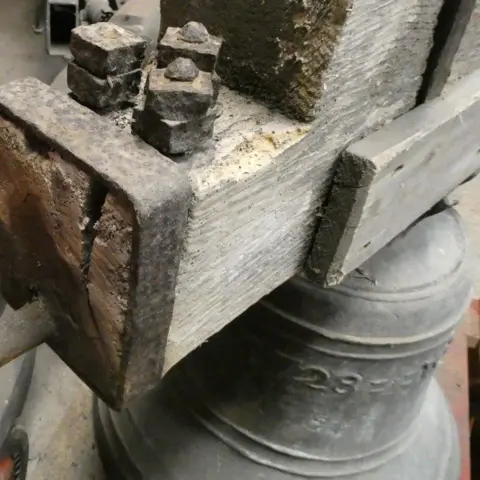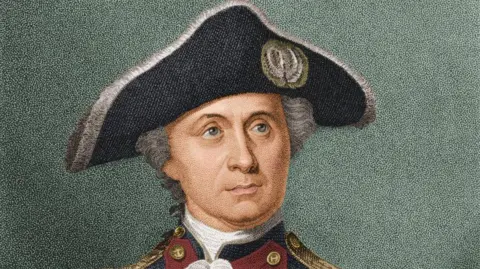The church bell with links to Scots naval pioneers
 BBC
BBCIt was nearly 300 years ago in the Solway coastal village of Kirkbean that a bronze church bell was dedicated to the parish minister.
It has direct connections to two Scottish naval pioneers from the area.
However, the passing centuries have taken their toll and a battle is now ongoing to safeguard its future.
The hope is that it can once again ring out as close as possible to its original home.
 Ronnie Stevenson
Ronnie StevensonThe bell was cast in 1728 and has links to two men who would carve out reputations much further afield.
One of them - John Paul Jones - is relatively well-known as a key figure in the founding of the American navy.
He would have heard the bell announcing services when he and his family went to church.
The other, though, is a much less widely-told tale.
John Campbell was the son of the minister of the same name to whom the bell was dedicated.
He played a major role in the development of naval navigation.
 Getty Images
Getty ImagesThe church in Kirkbean was decommissioned in 2010 and later converted into a private residence.
However, the bell and clock mechanism remained and Kirkbean Community Council (KCC) helped with their care and maintenance.
Last year, however, it became concerned by the state of the timbers supporting the bell and removed it - along with the mechanism - for safety, placing it in safe storage.
A bid for retrospective planning permission for that action is now with Dumfries and Galloway Council.
 Billy McCrorie
Billy McCrorieThe longer-term hope, however, is to restore the bell and bring it back into working order somewhere near its original home.
KCC secretary Ronnie Stevenson said it was a key historical item for the village.
"It is the bell that John Paul Jones and his family would have heard every Sunday morning," he said.
"John Paul Jones's father is buried in the old kirk and and it's also, of course, the bell that Admiral Campbell would have heard growing up as well.
"It just strikes us as really incredible that two really notable naval figures should come from this little plot of land.
"All that's left of that original church is the church bell, and that's why we want to preserve it."

Alistair Alcock is the owner of Arbigland House in the village and has written about the area's most illustrious figures.
He describes Campbell as someone who "seems to have largely disappeared from history" but left a "huge mark on naval navigation until we had GPS".
"It appears that in his case he was press-ganged into the navy as a teenager and probably started out as a servant to a captain - right at the bottom," he said.
"This is a man whose naval career ended with him being the Vice Admiral of the White, which was the position that Nelson held 20 years later at the Battle of Trafalgar.
"Indeed, John Campbell was the first captain of HMS Victory when it was launched."
His work to help improve naval navigation was born out of tragedy.
Campbell was a midshipman on HMS Centurion on a round-the-world voyage in the 1740s.
"This was treated as a tremendous success at the time - but actually it was a complete disaster," said Alistair.
"Probably nine-tenths of the crew died of scurvy and only one ship, Centurion, limped home.
"Can you imagine that this was a young teenager watching all his friends and fellows dying round him?
"And the reason was simple - the ship got lost."
However, the young Campbell worked with a professor of maths on the Centurion to tackle the problems of navigation.
Ultimately, his efforts would help to ensure the brass sextant became widely used and issues with pinpointing locations at sea were overcome.
 Ronnie Stevenson
Ronnie Stevenson"One of the things I did during the Covid lockdown was to investigate this man and try to make him far more famous, because he certainly deserves it," said Alistair.
"Why has he disappeared?
"I think basically because he wasn't interested in publicity."
He is fully behind efforts to bring the bell back into use in the area, which Ronnie hopes can happen as soon as possible.
"We're keeping it safe in the engineering workshop of the company that took it - that's temporary obviously," he said.
"There is no point in that bell sitting in the dark doing nothing, not able to be rung, not able to be seen.
"We need it out in the light, we need to tell its story."